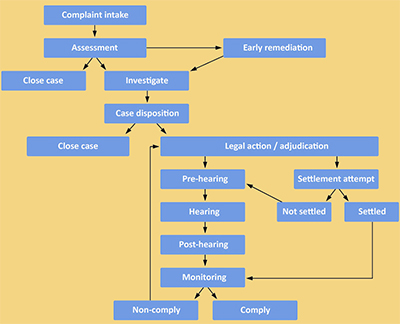Many Rotarians are passionate about Rotary, some so passionate that they forget that other Rotarians must be treated with respect.
In most case the best approach is to ignore the slight and get on with the important work of Rotary.
Occasionally, however, larger principles are at stake and the action so in violation of the spirit of the Four-Way Test and the Rotarian Code of Conduct that one needs to take a stand not only for the situation at hand but for the long term good of Rotary as an organization and the future of all Rotarians.
Let’s imagine a situation where a Rotarian writes an opinion piece under their own name and posts it to the club’s website. The club permits this, however, and also includes a disclaimer that opinion pieces are those of the author and do not represent the opinion of the club unless otherwise stated.
A couple of weeks later the club president receives a message by phone from a senior Rotarian or the District staff representative saying they want the piece taken down. What should the President do?
The President has a number of options not all of the same quality. The President could:
- Unilaterally meet with the Rotarian to whom the complaint is directed and demand that the offending piece be removed;
- Bring the complaint to the executive committee or board of directors, seek their advice and a motion to proceed to request that the piece be removed;
- Recognize that since the existence of opinion pieces was approved by a resolution of the board a solution rested in equal part with the board and club;
- Review the Club and Rotary International bylaws to see if any guidance could be found there
- If there is no process to review such a request, set one-up
- Tell the complainant or staff person that since the complainant refuses to identify the exact nature of the complaint and identify themselves the existence of an anonymous complaint is unacceptable and nothing will be done.
None of the above appear particularly attractive. To judge the President’s course of action one has to know what exactly the president was told. Was the president told exactly what piece generated the complaint and what within the piece did the complainant find objectionable. Did the complainant reveal their name and position? If done by the staff person on behalf of the complainant, did they provide those kinds of details and ask that they not be revealed.
Let’s start with the easiest action to analysis (d) consult with the RI Constitution and Bylaws and the club bylaws. Rather surprisingly there is nothing about how to handle a complaint about an individual Rotarian in either the RI by-laws or policy level. The same is true at the club level. There is, however, a detailed process regarding the process by which to lodge a complaint over the selection of the President-nominee designate. There is also an even more comprehensive policy now in pilot phase as to the process of logging a complaint about the selection of District Governor.
As a result, the President gets no guidance from the Bylaws of either RI or the club. Given the high ethical standard to which Rotary holds all members accountable this is a very glaring omission from our bylaws.
Many organizations have complaints policies much like item (f) which could be used as templates for a Rotary policy. Some of the salient features of such a policy are:
- Never to deal with an anonymous complaint except in the most unusual of circumstances such as accusations of sexual abuse in which case a report is made to the police and appropriate social service authorities;
- A member must put the complaint into written form and share it with the person to whom the complaint is directed;
- The member initiating the complaint must reveal their identity to the one being complained about
- The member at whom the complaint is directed must have a means by which a neutral body of peers may hear the evidence for the complaint and in rebuttal to the complaint.
- The member at whom the complaint is directed must have a right of appeal at the next highest level within the organisation eg. Club – next District.
- The club may delegate to The Sargent-at-Arms responsibility for acting as an ombudsman.
As previously mentioned, given the comprehensive nature of RI’s Policies and Procedures it is both surprising and disturbing that no such policy currently exists.
I doubt very much that such a situation arises very often but to those of us who blog about Rotary in a quasi-public domain are open to such attack. It has happened to me twice once at the District level during 2017 and just last week at the cub level. In both cases the president/DG unilaterally wanted all opinion not just one taken down. In neither instance was the nature of the complaint, and the identity of the complainant shared, or whether it was even known.
One would think that debate about the functioning of RI would be welcomed within forums composed of Rotarians, even if they are found on Facebook and LinkedIn. Blogging about Rotary is not done to denigrate Rotary but rather as a means to put forth suggestions for the building of Rotary. Unfortunately, not everyone views suggestions positively, and in a few cases actions are taken by influential Rotarians to take advantage of this gap in our bylaws. It is a gap we should fill at the earliest opportunity.
